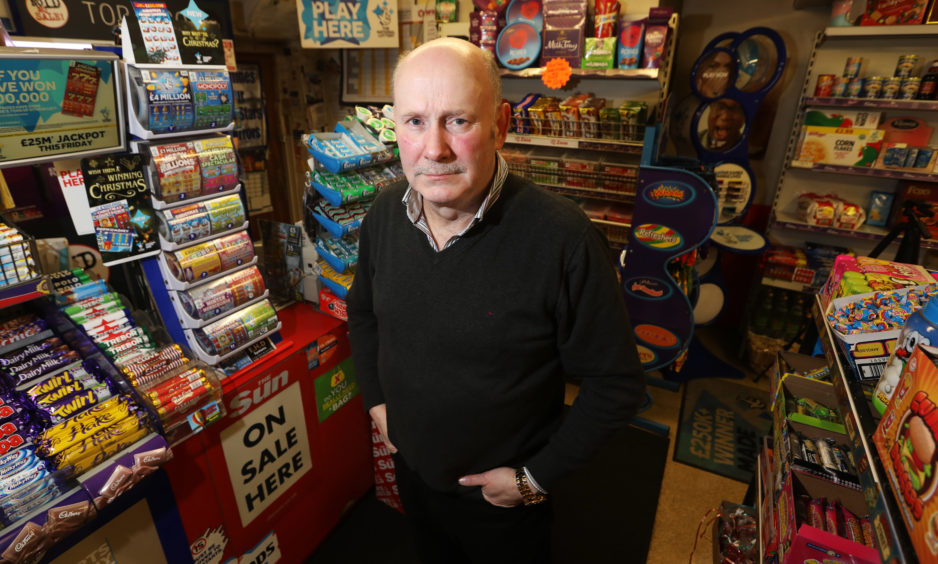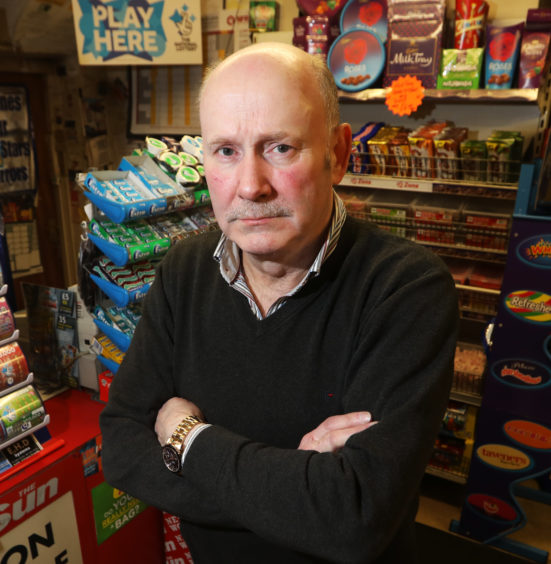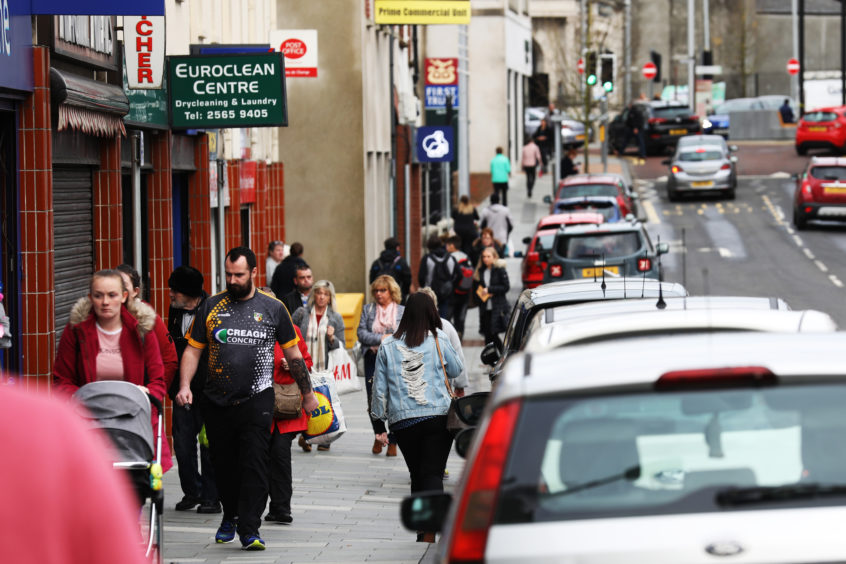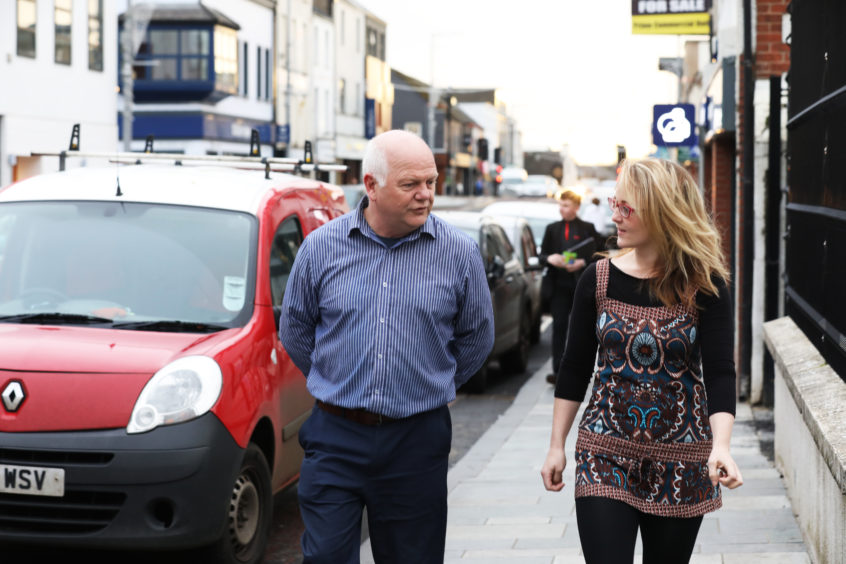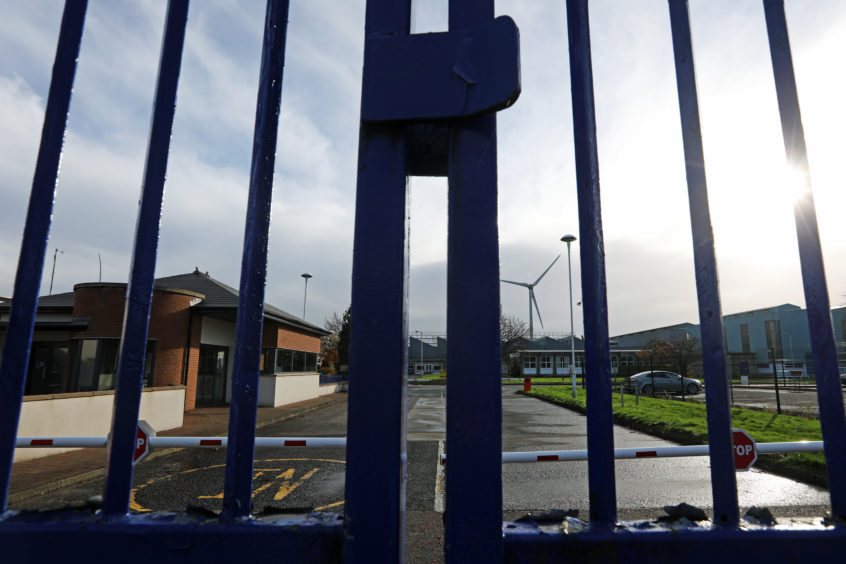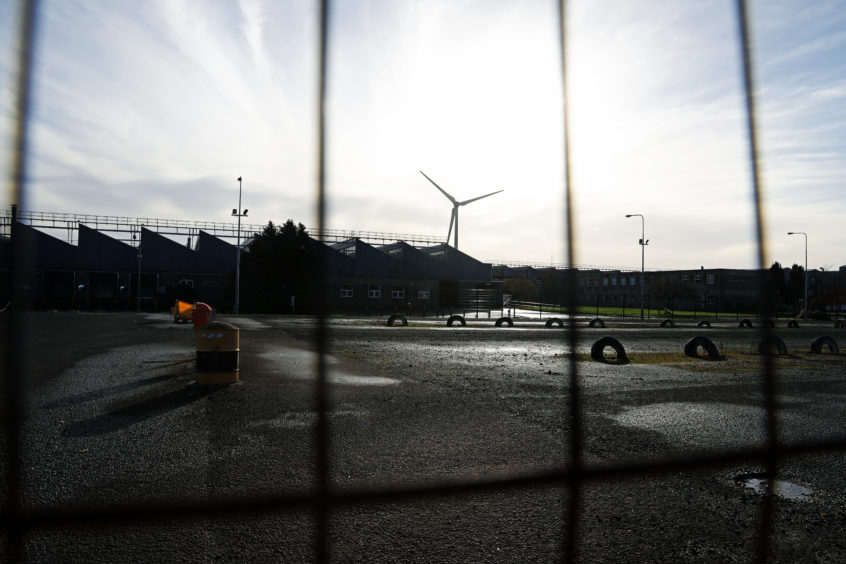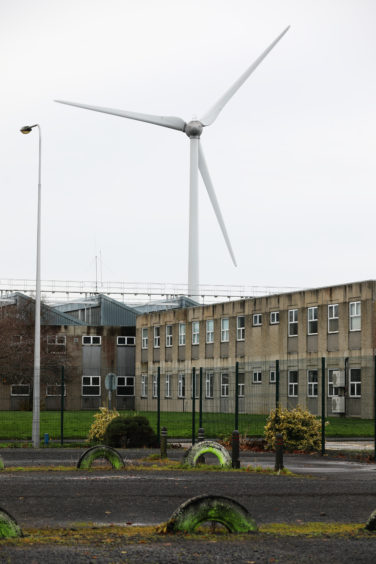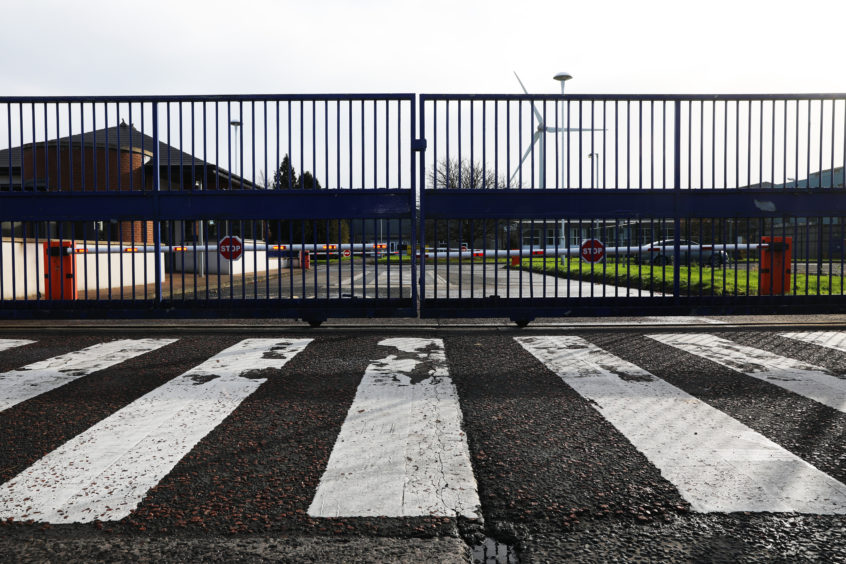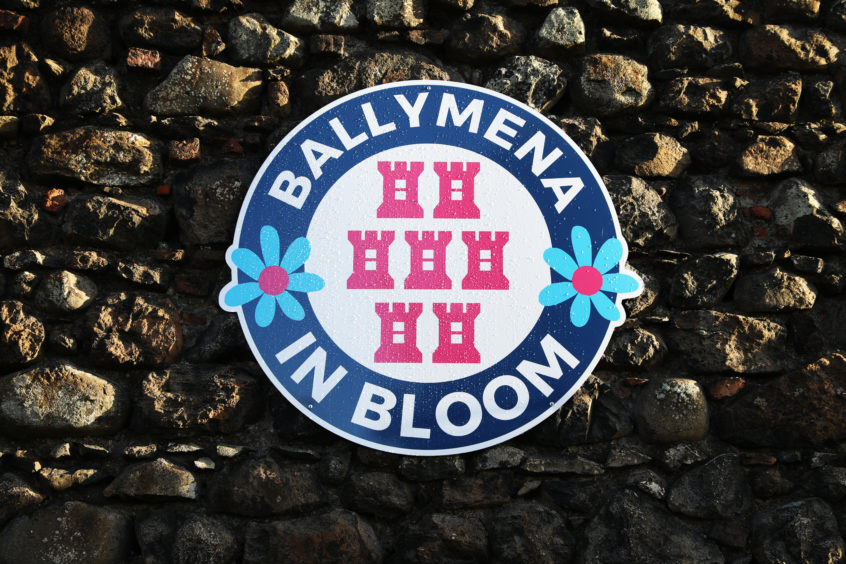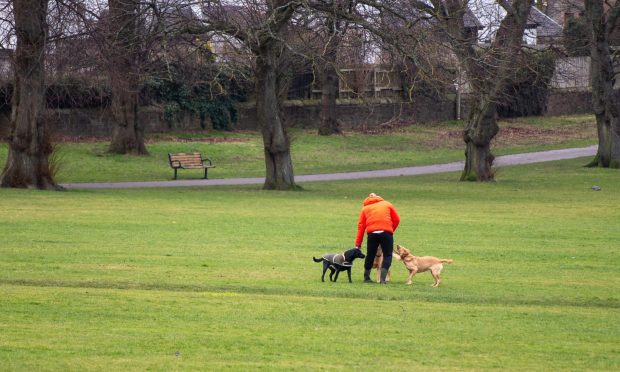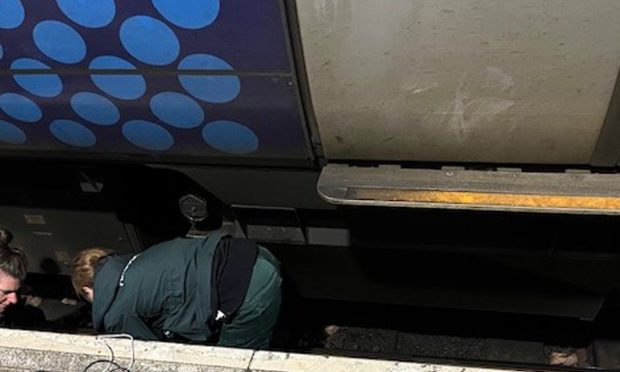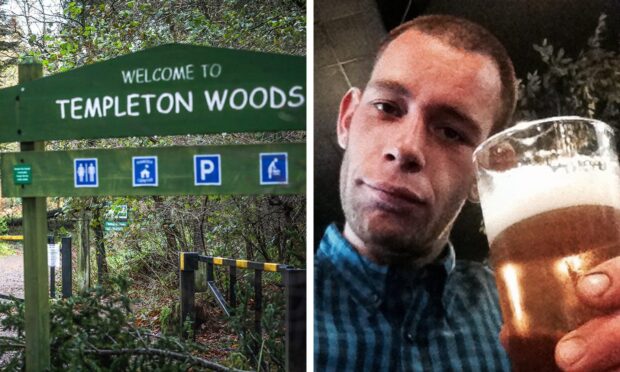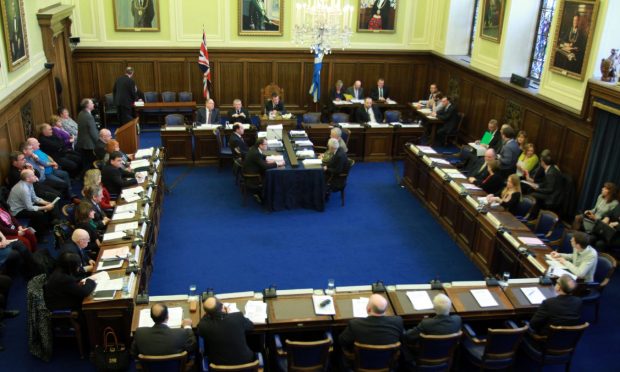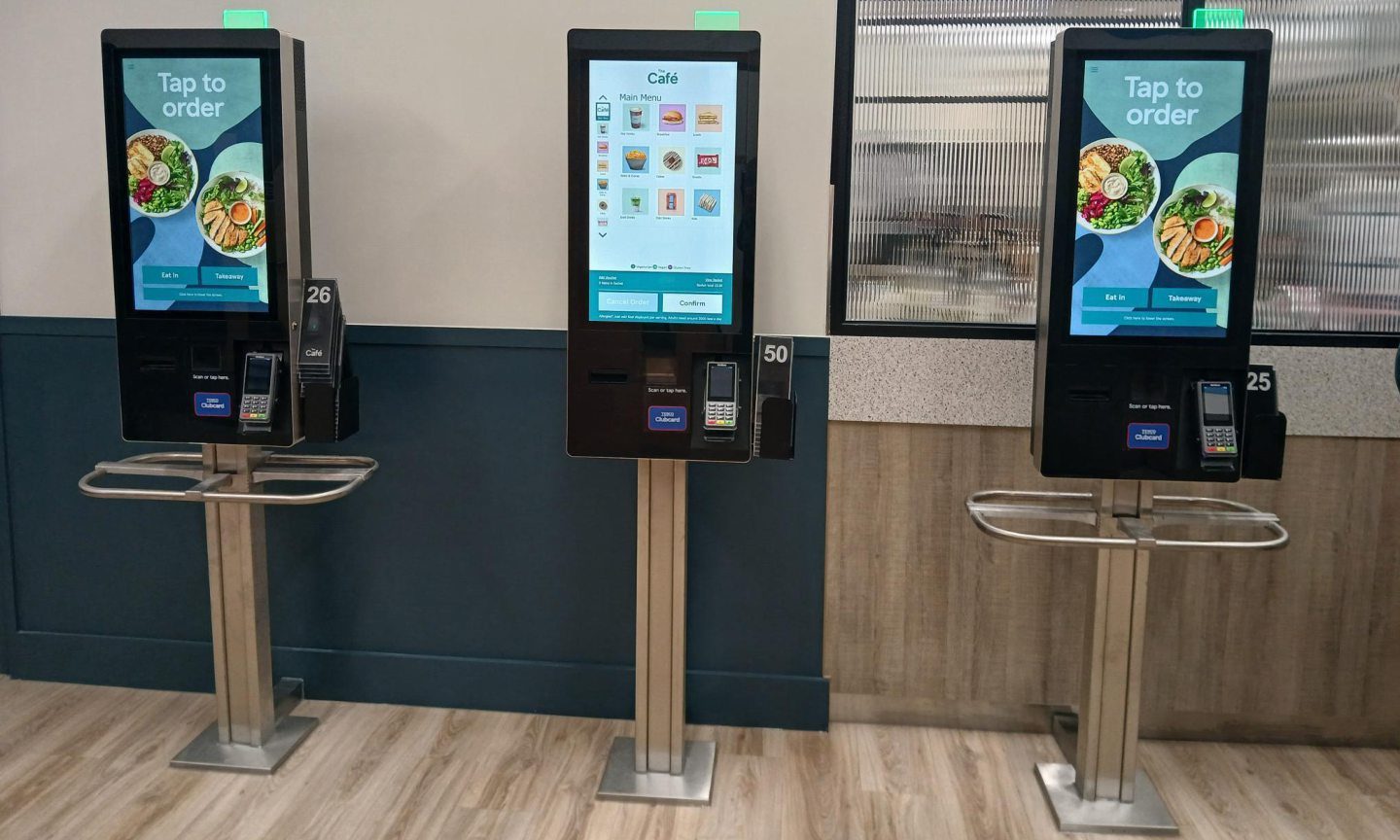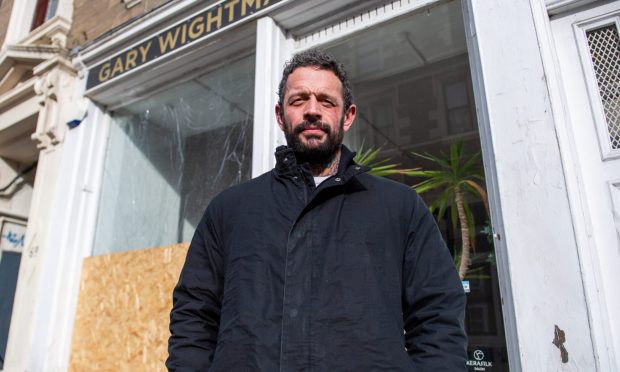In the second of a special three-part series, Michael Alexander visits the former Michelin site in Ballymena, Northern Ireland, and speaks to local traders about the impact the closure there is having on high street businesses.
It seems you don’t have to go far in Ballymena to bump into someone with a Dundee connection – and Belfast-born retired charity worker Muriel Burnside, 68, proves that point.
The mother-of-five and grandmother-of-seven is spending her last day as a volunteer at Save the Children which closed at the end of last week due to a change in lease.
However, not only did her grown up son and daughter study nursing and English literature respectively at Dundee University, her daughter, who now teaches in Argentina, once took a summer job on the factory floor at Michelin in Dundee, while a friend of her son – who now lives in Dunfermline and is married to a Dundee girl – worked at Ballymena Michelin and turned down a move to work at the Dundee plant.
Muriel says that internet shopping is having an impact on Ballymena’s high street like everywhere else.
However, she says the impact of Michelin and other well paid employers closing is also having a detrimental effect – and she fears the closure of Michelin could have a similar impact in Dundee.
“A lot of the shops here have closed in the high street and it’s a direct consequence of the closure of JTI (the cigarette factory) and Michelin within months of each other,” she said.
“A lot of the clothes shops have gone. Charity shops have been picking up some trade but even they are now struggling. A lot of people will buy Primark – not top of the range clothing.
“A lot of units are empty in the town centre. A lot of family owned businesses have gone.
“We lost a big electrical store.
“It’s just the way finance is going everywhere but people can’t afford to go out buying the way they did.
“It’s devastating in more ways than one – and won’t happen overnight.
“I really feel sorry for Dundee because like here it doesn’t have a lot of big employers.”
Eugene Diamond is no stranger to change – or the impact of wider events out with his control.
As a young man he was made redundant from a clothes shop in the town, he can remember the names and faces of customers who were murdered during ‘The Troubles’, and in recent years he has successfully diversified his newsagents’ business to deal with a changing retail market.
But after 39 years of running his shop at the heart of the community, the 61-year-old can’t remember anything as impactful as the closure of Michelin this year combined with the closure of the JTI cigarette factory last year and Patton builders before that – a combined loss of more than 2000 jobs in six years.
“My business is doing ok because I’ve diversified into sweets and other things,” he told The Courier.
“But my shop was the closest to Michelin if coming from Ballymena and heading out.
“We have now lost the passing trade of about 30 to 40 workers every day. I was on first name terms with all these guys and knew all about their families.
“I’m still friendly with folk but saying that people don’t go out of their way to visit if they are not walking past anymore.”
Eugene said when he heard the news about the planned Dundee closure, his thoughts immediately turned to those former Ballymena workers who had been persuaded to relocate.
Ballymena is a tight knit community – a “good town” which had always been successful, he said.
But recent economic blows had been unprecedented.
In terms of the wider economic impact on Ballymena, he said other businesses like sandwich bars and fish and chip shops were also suffering.
Eugene agreed it might be a “couple of years down the road” before the full impact of Michelin was truly felt because people who got packages still had disposable income. New jobs could also be found.
However, the reality was, he said, that no jobs as well paid as those lost would likely return to Ballymena in such numbers. He also said a lot of contracted staff were ultimately “cannon fodder”.
He knew cleaners, for example, who got very little compensation when Michelin closed.
Having worked at local newspaper the Ballymena Guardian for 33 years, sports editor and deputy editor Shaun O’Neill, 57, is the publication’s longest serving employee.
Michelin’s closure was certainly a shock –despite previous warnings of its demise – and he said many town centre shops were missing spending from Michelin and JTI “big time”.
However, other businesses are riding the storm and remain hopeful that a planned “jazzing up” of the town centre through a proposed investment will help.
Fellow journalist Claire Tennyson, 33, who has worked at the Ballymena Guardian for eight years, said Michelin brought people to work from all over Northern Ireland.
The biggest worry for her was workers with young families who might lose faith in the future.
Turning Point – a regional organisation based in Antrim and Ballymena which offers support, intervention and preventative awareness programmes around the issues of suicide, self-harm, addiction and mental health – said it had seen a rise in males dropping in for advice in Ballymena recently.
However, staff said there was no evidence this was directly related to recent factory closures – although it was a situation they would continue to monitor.
Politicians might have high hopes for the future of the former Michelin factory site around two miles from the centre of Ballymena where the last of its 800+ workers finished up just a few months ago.
But amid stringent efforts to create new jobs and give it a new lease of life, there’s something eerie about the sprawling complex when viewed up close.
Heras fencing blocks what was once the main entrance to the Michelin staff car park – and yet the electronic barrier in front of it is still working and if you get too close it still raises automatically on a road to nowhere.
The former car park itself, already crumbling, features half-tyres sticking out the ground where once there were parking spaces.
And in the background, two giant wind turbines – not dissimilar to that found at Michelin in Dundee – still turn against the autumnal sun.
Round the corner, the once buoyant Michelin Athletic Club looks derelict with its football pitch and rusting goalposts looking sad and abandoned.
And while no Michelin signage remains, peeling blue paint on the front gates is reminiscent of the colour scheme found at the entrance to the plant in Dundee.
The Courier meets former Michelin employee and Ballymena man Peter Parkhill, 54, who worked for eight years as a tyre maker and latterly drove a forklift truck.
He was made redundant on the last day of June this year – 31 months after the closure announcement – and still gets emotional when he reflects on how the factory that existed for most of his life came to an end.
“There had been rumours going around for a while, but when a workforce of more than 800 people are taken in one morning and told that it’s closing, it was a bit of a shock,” he said, gazing across the abandoned site.
“To be honest 2.5 years was probably too long for people to be waiting for the closure to happen. “People were on edge, knew they were losing their jobs, were unsure of the future and were scared to take the step out into the unknown when they had been earning £500 or £600 per week.”
Peter is a grandfather with grown up children. However, unemployment has still had an impact on him and he said it’s particularly difficult finding work at his age.
With the loss of around 2200 heavy industry jobs in Ballymena since 2012, he claimed that in spite of political rhetoric, people locally are “disengaging” with politicians.
The absence of a government at Stormont meant there was “no leadership” while uncertainties over Brexit were also having an impact, he said.
Peter claimed Michelin top management knew Ballymena was closing up to a year before staff were told, and he wouldn’t be surprised if a similar situation existed in Dundee. And yet around 20 people made redundant in Ballymena were allowed to relocate to Dundee, he said, and were now left “high and dry”.
“A senior manager at Ballymena who I can’t name said he fought for a full year to save the Ballymena plant before they had to announce the closure,” he said. “I’d imagine Dundee would be similar. There’s a feeling amongst all the workforce that it’s Michelin’s plan to pull out of the UK.”
Peter said Ballymena was becoming a “ghost town” as a result of this and other recent closures and when peoples’ redundancy money ran out feared it would become worse.
There was also a knock-on economic effect with 200 subcontractors formerly dependent on the Michelin site also hit.
The town had a major drug problem over 20 years ago, he said, and “that’s surfacing again” due to disillusionment and lack of opportunities.
Life chances for local youngsters were now “limited”, he said, and it was no longer a case of young people having to leave town for Belfast to find work – he claimed many were having to leave Northern Ireland altogether, echoing patterns elsewhere in the UK where former industrial towns had lost their purpose.
Rightly or wrongly, many former Michelin workers in Ballymena voted for Brexit, he said, because they believed immigrants from the EU reduced their chances of work.
“Ballymena has gradually declined from what was the biggest market town in Northern Ireland with over 30 engineering and manufacturing processing plants to there being none left!” he said.
“Whether we like to say it or not, immigration is also an issue. If people travel from foreign shores to work here, it limits what local people can do. When there’s a vacuum and people are struggling to survive – to feed their families – anything can happen.”
COMMENT BY MICHAEL ALEXANDER
To let signs, vaping shops, charity shops and nail bar salons…in many ways Ballymena’s high street looks little different to anywhere else these days as it struggles to compete against internet shopping, rising prices and out of town retail parks.
But ask locals whether the recent closure of big manufacturing employers like Michelin and JTI Gallaher is also having a direct impact on the fortunes of business, and just about everyone agrees that it is.
Redundancy payments are softening the blow in the short term as politicians work to attract new investment.
However, with anxiety about the future and less money in peoples’ pockets all round, businesses are inevitably suffering.
Ballymena is still a bustling place with The Braid museum and arts centre proving to be a popular draw while cosmetically at least, flower beds and colourful garden murals help brighten otherwise drab town centre walls.
But while cosmetics won’t replace secure well paid jobs, they do help lift the spirits as the town searches for what it hopes will be a bright new future, and hopefully a return to jangling town centre tills.
* In Friday’s Courier, Michael Alexander speaks to Ballymena politicians about how they approached the closure of their Michelin plant and speaks to the Dundee University graduate leading the company that has taken over the former Balleymena Michelin site.
